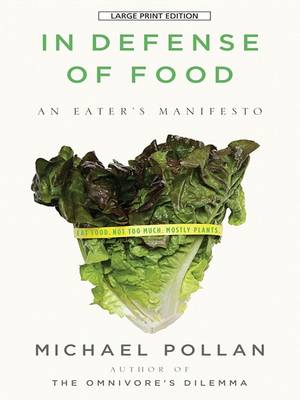
#1 New York Times Bestseller from the author of How to Change Your Mind, The Omnivore's Dilemma, and Food Rules
Food. There's plenty of it around, and we all love to eat it. So why should anyone need to defend it?
Because in the so-called Western diet, food has been replaced by nutrients, and common sense by confusion--most of what we’re consuming today is longer the product of nature but of food science. The result is what Michael Pollan calls the American Paradox: The more we worry about nutrition, the less healthy we see to become. With In Defense of Food, Pollan proposes a new (and very old) answer to the question of what we should eat that comes down to seven simple but liberating words: "Eat food. Not too much. Mostly plants." Pollan’s bracing and eloquent manifesto shows us how we can start making thoughtful food choices that will enrich our lives, enlarge our sense of what it means to be healthy, and bring pleasure back to eating.
"Michael Pollan [is the] designated repository for the nation's food conscience."—Frank Bruni, The New York Times
" A remarkable volume . . . engrossing . . . [Pollan] offers those prescriptions Americans so desperately crave."—The Washington Post
"A tough, witty, cogent rebuttal to the proposition that food can be redced to its nutritional components without the loss of something essential... [a] lively, invaluable book."—Janet Maslin, The New York Times
"In Defense of Food is written with Pollan's customary bite, ringing clarity and brilliance at connecting the dots."—The Seattle Times
Michael Pollan’s most recent food book Cooked: A Natural History of Transformation--the story of our most trusted food expert’s culinary education--was published by Penguin Press in April 2013, and in 2016 it served as the inspiration for a four-part docuseries on Netflix by the same name.
Pollan is also the author of How to Change Your Mind: What the New Science of Psychedelics Teaches Us About Consciousness, Dying, Addiction, Depression, and Transcendence
Originally posted on my blog, A Lovely Bookshelf on the Wall:
"Eat food. Not too much. Mostly plants." This is the main theme throughout and a good summary of Michael Pollan's In Defense of Food; it even appears on the cover! The book is divided into three parts:
Part 1, The Age of Nutritionism, dismantled a lot of misconceptions I had, leaving me frustrated and suspicious of most nutritional information I've received throughout my life. The problems with research are so complex, with countless variables impossible to isolate. On top of that, business and politics muddy the waters in some pretty despicable ways.
Part 2, The Western Diet and the Diseases of Civilization, is where I started to feel bogged down. Reading this section was slow going, but I greatly appreciated the how thorough and well-researched it was.
Part 3, Getting Over Nutritionism, contains practical advice applicable to daily living. Pollan also addressed some questions that came up while reading the previous two sections, which helped the book feel cohesive. This is a useful, valuable section I often feel is missing from other books in this genre.
Although In Defense of Food started out with a bang, I found it gradually grew less and less interesting. The political and economic ties to how our food culture has deteriorated was the most eye-opening to me, but that was in the first section of the book. The rest of the information is fantastic, but most of it wasn't terribly new to me: I've heard or read the same ideas elsewhere, and a lot of it is just common sense.
If parts 1 and 2 interest you, read this book! If you're considering it mostly for the information contained in part 3, you might want to skip it and read Hungry by Darlene Barnes instead: same information delivered as a memoir, fun to read, with some very simple recipes scattered throughout.
Reading updates
-
Started reading
-
15 May, 2014:
Finished reading
-
15 May, 2014:
Reviewed
